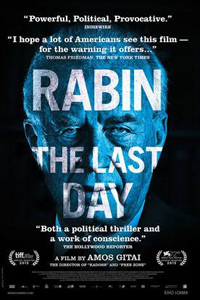Prime Time: Gitai Revisits the Assassination of Israeli Prime Minister
 Israeli auteur Amos Gitai reenacts the final moments of Prime Minister Yitzak Rabin prior to his assassination during the Oslo peace talks with Palestine twenty years ago. Laborious in its attempt to convey the political unrest at home which eventually resulted in Rabin’s murder, Gitai crafts the portrait as a docu-drama, mixing newsreel footage with performance. The result is a sometimes intense, yet professorial endeavor on the dangerousness of extremist religion and the degrading aftershocks which halted a progression towards peace. Gitai keeps the tone at a steady simmer and the film manages to be an unsettling reflection of a country perilously divided of a relatively recent tragedy which pitched the turmoil into a tunnel where a light at the end has yet to be conceived.
Israeli auteur Amos Gitai reenacts the final moments of Prime Minister Yitzak Rabin prior to his assassination during the Oslo peace talks with Palestine twenty years ago. Laborious in its attempt to convey the political unrest at home which eventually resulted in Rabin’s murder, Gitai crafts the portrait as a docu-drama, mixing newsreel footage with performance. The result is a sometimes intense, yet professorial endeavor on the dangerousness of extremist religion and the degrading aftershocks which halted a progression towards peace. Gitai keeps the tone at a steady simmer and the film manages to be an unsettling reflection of a country perilously divided of a relatively recent tragedy which pitched the turmoil into a tunnel where a light at the end has yet to be conceived.
On October 4, 1995, Israeli Prime Minister Yitzak Rabin was assassinated. Gitai focuses specifically on events just prior to and following this event, including the increasingly hostile sentiments against Rabin’s left wing government. On the day in question, Rabin attended a rally meant to gather support for Israeli/Palestinian peace talks, a notion which seems impossible when witnessing a myriad of protestors burning Gestapo dressed effigies of the leader in plain view. Following the assassination, we closely examine the conspiracy theories which have haunted the event thanks to confusing elements of testimony, which upon examination sound like officials squirming away from direct blame or accusations of failure.
Beginning in a contemporary interview with Shimon Peres, the foreign minister of Rabin’s government who succeeded him, we return to the seething crowd gathered at the peace talks on the night in question. Gitai painstakingly attempts to recreate the incredible tension of the period, and while Rabin’s murder was the undertaking of one man, Yigal Amir (Yogev Yefet), we get the sense it could have been any number of individuals opposing his leadership. In essence, Gitai’s film alludes to the Prime Minister’s assassination as a sort of wish fulfillment at the hands of an angry mob with many disparate members. At times, these various malcontented voices take on a sort of ludicrous, near laughable energy, such as woman psychologist who breaks down in tears as she suggests Rabin should be committed to an asylum.
Rabin, the Last Day floats into the health professionals attempting to resuscitate the leader with a paralyzed gaze before settling into a rehash of testimony taken directly from court documents. Blame for the lack of security apprehending Amir is passed back and forth between the police and the secret service. The driver and the bodyguard appear, understandably shaken. Members of the state committee are cold, snippy, and sarcastic with the lack of protection in place for Rabin on his last day. And yet Gitai’s scope appears to be much broader, casting the blame on the state’s inability to control the wave of hate and fundamentalist rallying.
Technically speaking, Rabin, the Last Day plays like a sleek documentary, and it’s sometimes easy to forget what could be conjecture and what’s molded from actual documentation. Exhausting and upsetting, photographed with an air of dreadful precision by Eric Gautier, it’s a compelling reenactment on a twenty year anniversary where changes may have occurred while dangerous sentiments remain the same.
★★★/☆☆☆☆☆


